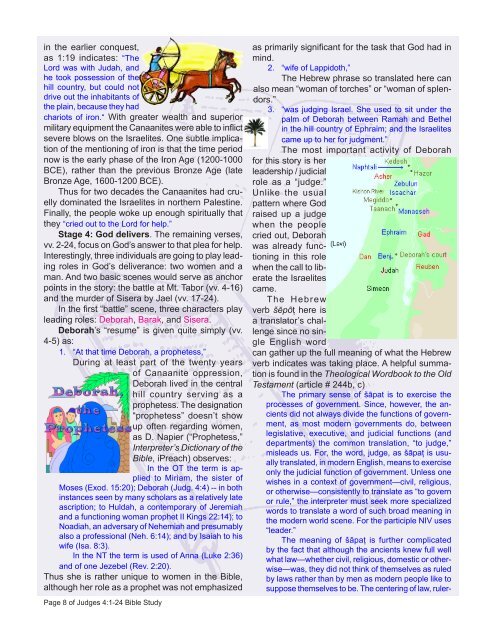Deborah the deliverer - Lorin
Deborah the deliverer - Lorin
Deborah the deliverer - Lorin
Create successful ePaper yourself
Turn your PDF publications into a flip-book with our unique Google optimized e-Paper software.
in <strong>the</strong> earlier conquest,<br />
as : 9 indicates: “The<br />
Lord was with Judah, and<br />
he took possession of <strong>the</strong><br />
hill country, but could not<br />
drive out <strong>the</strong> inhabitants of<br />
<strong>the</strong> plain, because <strong>the</strong>y had<br />
chariots of iron.“ With greater wealth and superior<br />
military equipment <strong>the</strong> Canaanites were able to inflict<br />
severe blows on <strong>the</strong> Israelites. One subtle implication<br />
of <strong>the</strong> mentioning of iron is that <strong>the</strong> time period<br />
now is <strong>the</strong> early phase of <strong>the</strong> Iron Age ( 200- 000<br />
BCE), ra<strong>the</strong>r than <strong>the</strong> previous Bronze Age (late<br />
Bronze Age, 600- 200 BCE).<br />
Thus for two decades <strong>the</strong> Canaanites had cruelly<br />
dominated <strong>the</strong> Israelites in nor<strong>the</strong>rn Palestine.<br />
Finally, <strong>the</strong> people woke up enough spiritually that<br />
<strong>the</strong>y “cried out to <strong>the</strong> Lord for help.”<br />
Stage 4: God delivers. The remaining verses,<br />
vv. 2-24, focus on God’s answer to that plea for help.<br />
Interestingly, three individuals are going to play leading<br />
roles in God’s deliverance: two women and a<br />
man. And two basic scenes would serve as anchor<br />
points in <strong>the</strong> story: <strong>the</strong> battle at Mt. Tabor (vv. 4- 6)<br />
and <strong>the</strong> murder of Sisera by Jael (vv. 7-24).<br />
In <strong>the</strong> first “battle” scene, three characters play<br />
leading roles: <strong>Deborah</strong>, Barak, and Sisera.<br />
<strong>Deborah</strong>’s “resume” is given quite simply (vv.<br />
4-5) as:<br />
. “At that time <strong>Deborah</strong>, a prophetess,”<br />
During at least part of <strong>the</strong> twenty years<br />
of Canaanite oppression,<br />
<strong>Deborah</strong> lived in <strong>the</strong> central<br />
hill country serving as a<br />
prophetess. The designation<br />
“prophetess” doesn’t show<br />
up often regarding women,<br />
as D. Napier (“Prophetess,”<br />
Interpreter’s Dictionary of <strong>the</strong><br />
Bible, iPreach) observes:<br />
In <strong>the</strong> OT <strong>the</strong> term is applied<br />
to Miriam, <strong>the</strong> sister of<br />
Moses (Exod. 5:20); <strong>Deborah</strong> (Judg. 4:4) -- in both<br />
instances seen by many scholars as a relatively late<br />
ascription; to Huldah, a contemporary of Jeremiah<br />
and a functioning woman prophet II Kings 22: 4); to<br />
Noadiah, an adversary of Nehemiah and presumably<br />
also a professional (Neh. 6: 4); and by Isaiah to his<br />
wife (Isa. 8:3).<br />
In <strong>the</strong> NT <strong>the</strong> term is used of Anna (Luke 2:36)<br />
and of one Jezebel (Rev. 2:20).<br />
Thus she is ra<strong>the</strong>r unique to women in <strong>the</strong> Bible,<br />
although her role as a prophet was not emphasized<br />
Page 8 of Judges 4: -24 Bible Study<br />
as primarily significant for <strong>the</strong> task that God had in<br />
mind.<br />
2. “wife of Lappidoth,”<br />
The Hebrew phrase so translated here can<br />
also mean “woman of torches” or “woman of splendors.”<br />
3. “was judging Israel. She used to sit under <strong>the</strong><br />
palm of <strong>Deborah</strong> between Ramah and Be<strong>the</strong>l<br />
in <strong>the</strong> hill country of Ephraim; and <strong>the</strong> Israelites<br />
came up to her for judgment.”<br />
The most important activity of <strong>Deborah</strong><br />
for this story is her<br />
leadership / judicial<br />
role as a “judge.”<br />
Unlike <strong>the</strong> usual<br />
pattern where God<br />
raised up a judge<br />
when <strong>the</strong> people<br />
cried out, <strong>Deborah</strong><br />
was already functioning<br />
in this role<br />
when <strong>the</strong> call to liberate<br />
<strong>the</strong> Israelites<br />
came.<br />
The Hebrew<br />
verb šĕpôţ here is<br />
a translator’s challenge<br />
since no single<br />
English word<br />
can ga<strong>the</strong>r up <strong>the</strong> full meaning of what <strong>the</strong> Hebrew<br />
verb indicates was taking place. A helpful summation<br />
is found in <strong>the</strong> Theological Wordbook to <strong>the</strong> Old<br />
Testament (article # 244b, c)<br />
The primary sense of šāpat is to exercise <strong>the</strong><br />
processes of government. Since, however, <strong>the</strong> ancients<br />
did not always divide <strong>the</strong> functions of government,<br />
as most modern governments do, between<br />
legislative, executive, and judicial functions (and<br />
departments) <strong>the</strong> common translation, “to judge,”<br />
misleads us. For, <strong>the</strong> word, judge, as šāpaţ is usually<br />
translated, in modern English, means to exercise<br />
only <strong>the</strong> judicial function of government. Unless one<br />
wishes in a context of government—civil, religious,<br />
or o<strong>the</strong>rwise—consistently to translate as “to govern<br />
or rule,” <strong>the</strong> interpreter must seek more specialized<br />
words to translate a word of such broad meaning in<br />
<strong>the</strong> modern world scene. For <strong>the</strong> participle NIV uses<br />
“leader.”<br />
The meaning of šāpaţ is fur<strong>the</strong>r complicated<br />
by <strong>the</strong> fact that although <strong>the</strong> ancients knew full well<br />
what law—whe<strong>the</strong>r civil, religious, domestic or o<strong>the</strong>rwise—was,<br />
<strong>the</strong>y did not think of <strong>the</strong>mselves as ruled<br />
by laws ra<strong>the</strong>r than by men as modern people like to<br />
suppose <strong>the</strong>mselves to be. The centering of law, ruler-
















